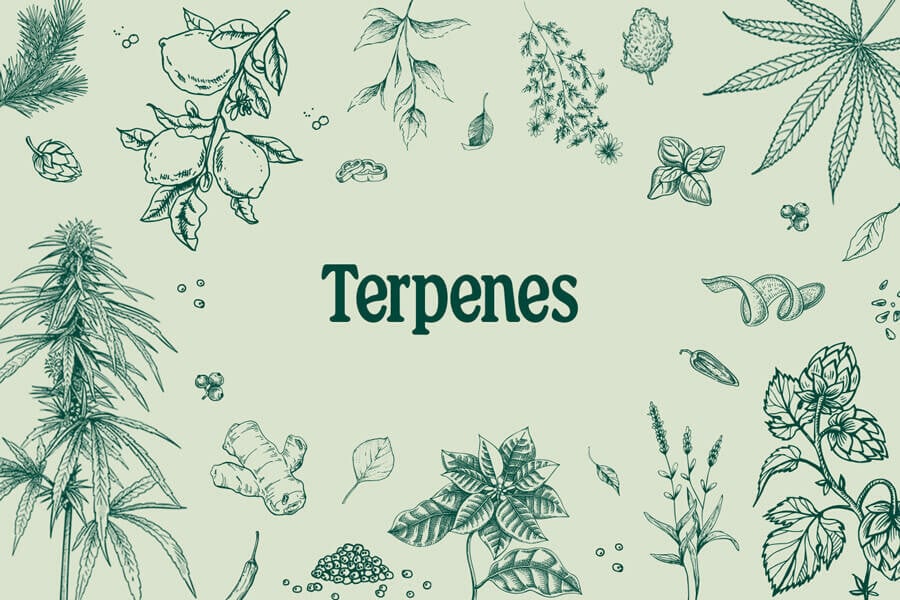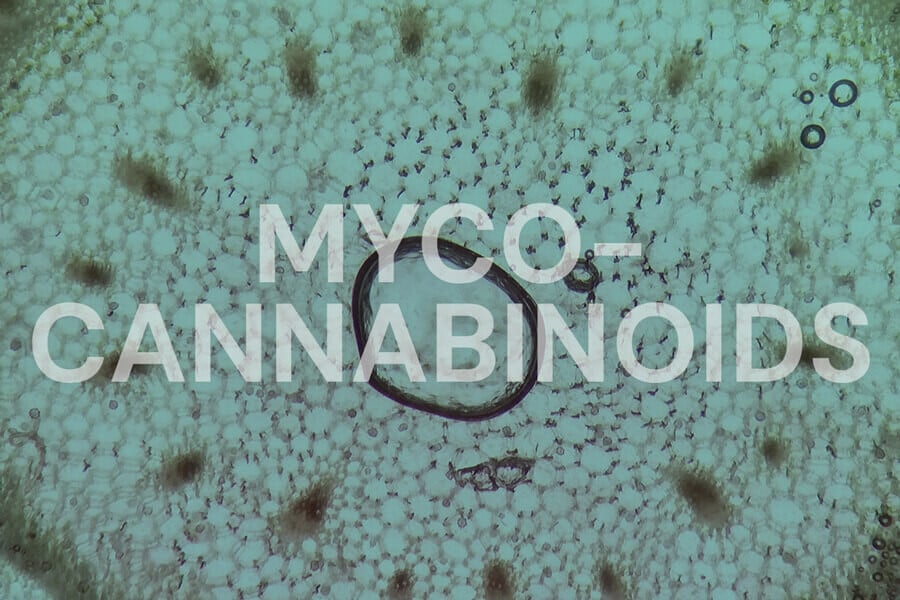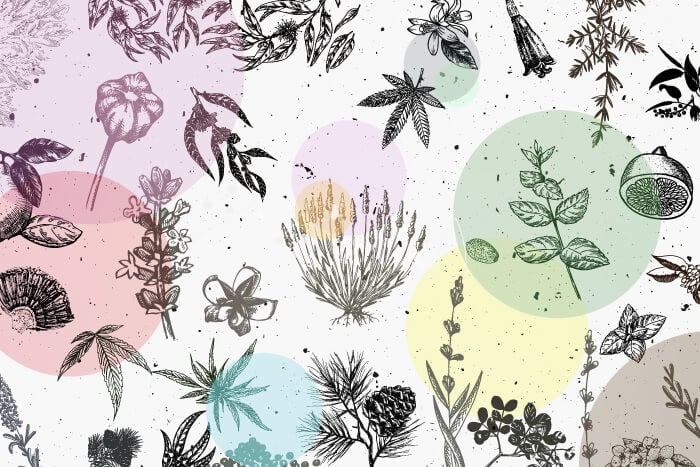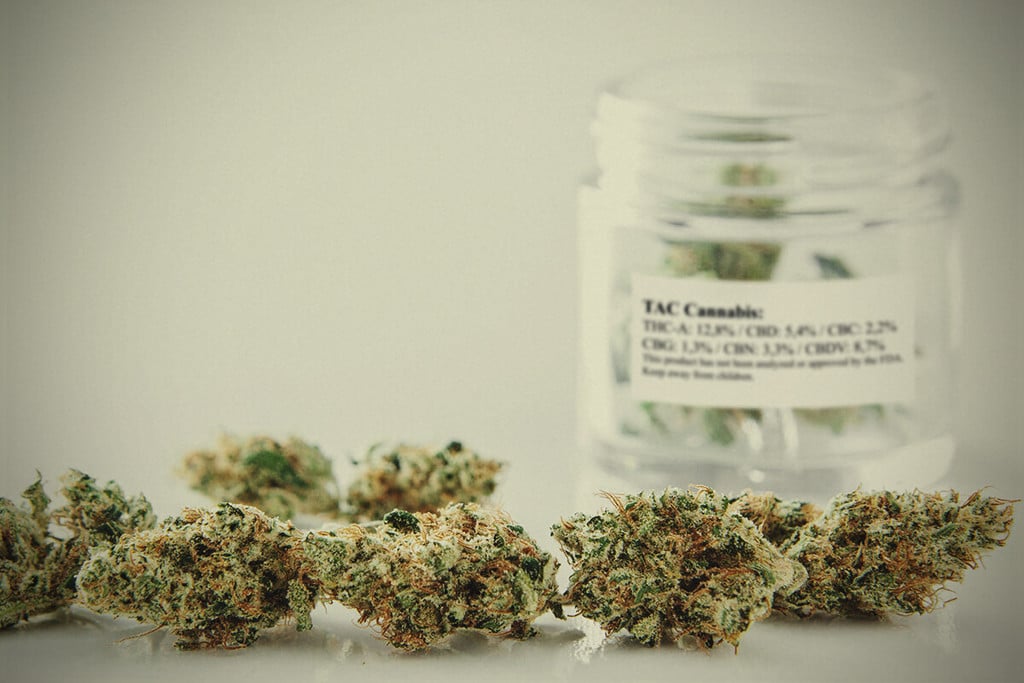.
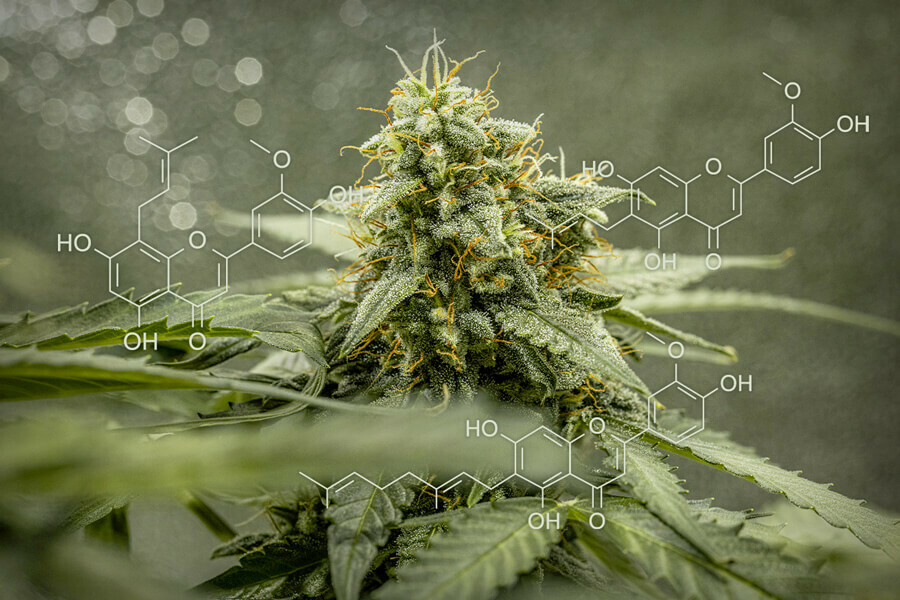
Cannflavins: Unique Flavonoids Found in Cannabis
Cannflavins are a type of flavonoid unique to the cannabis plant. With potential wellness benefits, if consumed appropriately, they're now catching the attention of breeders and researchers alike. But what are they, and what might they be able to do for us?
Contents:
Cannabis breeding has become more and more specific and deliberate in recent years. Some breeders are now fine-tuning plants to exhibit higher concentrations of once-scarce cannabinoids and terpenes.
Additionally, there is another class of compounds that influences the way weed looks, smells, and, potentially, affects us humans: flavonoids. Here we take a look at cannflavins[1]—flavonoids unique to the cannabis plant. What are they, what purpose do they serve in cannabis, and what might they do for us?
Cannabis Chemicals: A Look Beyond Cannabinoids and Terpenes
Most everyone knows that cannabis plants produce THC—the cannabinoid chiefly responsible for weed’s psychotropic effects. Many others are also familiar with CBD, another cannabinoid, which is featured in a vast array of supplements and other products. And then there are terpenes—such as myrcene, limonene, and pinene—which not only show up in cannabis plants, but in a wide variety of other natural sources.
Well, alongside a slew of other compounds, the cannabis plant also produces flavonoids, including its own unique cannflavins. In addition to playing several roles in the plant itself, it’s thought that cannflavins may also affect humans who consume the herb—but more on this shortly.
.jpg)
.jpg)
An Introduction to Cannflavins
Flavonoids are polyphenolic secondary metabolites found throughout the earth’s flora. These compounds are synthesised in plants and have many roles, including providing pigment in flower petals.
Other functions include:
- UV filtration
- Symbiotic nitrogen fixation
- Chemical messengers
- Physiological regulators
- Cell cycle inhibitors
Flavonoids secreted into the soil can also help to signal to potential symbiotic partners, such as bacteria and fungi, and assist them in colonising the roots of the plant. It is also thought that they can have inhibitory effects against potential diseases in the soil.
In addition to their roles in the cannabis plant, cannflavins are pharmacologically active, much like terpenes. As such, breeders and researchers are now looking to cannflavins as the next frontier for fine-tuning strains and addressing various health-related conditions.
Cannflavins & the Entourage Effect: Is There Synergy?
The entourage effect is the collective effect that all of the pharmacologically active compounds in cannabis exhibit when consumed together. As a simplified example, think of how the presence of THC, CBD, and various terpenes affect the overall psychoactive experience when taken together, as opposed to the experience of vaping pure THC crystals.
In reality, when it comes to the comprehensive effects of cannabis, we have to consider hundreds, if not thousands, of compounds including cannabinoids, terpenes, flavonoids (including cannflavins), and others. We are only beginning to unlock the effects and mechanisms of most of these compounds, with not even THC and CBD being fully understood. And researchers are indeed eager to discover if cannflavins can influence the entourage effect.
Unfortunately, there’s very little data of the influence of cannflavins on the effects of cannabis. At present, we don't know if cannflavins interact directly with the endocannabinoid system (ECS), the regulatory system via which many cannabis compounds interface with the body. Furthermore, though cannflavins can affect the body if cannabis is eaten, it’s uncertain if they survive heating or whether they can be absorbed via the lungs. So if you’re determined to consume cannflavins, you might be better off eating cannabis sprouts instead of smoking buds!
.jpg)
.jpg)
Which Cannflavins Are Found in Cannabis?
Below, we’ll look at three cannabis-specific flavonoids, discussing the little we know about their potential effects on humans.
-
Cannflavins A, B, and C
There are three flavonoids found only in the cannabis plant, and these have been named, suitably, cannflavin A, cannflavin B, and cannflavin C.
A and B were discovered in the 1980s, and C was discovered in 2008. All have similar properties and are, specifically, prenylflavonoids. Moreover, A and B are both biosynthesised in the same way, via prenylation of chrysoeriol.
It has been suggested that there may be more cannflavins[2] that are yet to be elucidated. The reason for this is that cannflavins are produced not just as a consequence of genetic makeup, but in response to environmental stimuli. As most research has been conducted on plants grown in laboratory conditions, in more natural conditions, unknown cannflavins might appear.
.jpg)
.jpg)
To quote Bautista, Yu, and Tian:
“...cannflavin A accumulation is determined not only by the genetic background, but as a response to temperature, solar radiation, rainfall, and humidity in the environment. Moreover, higher elevation positively impacts the content of cannflavin A, B, and C in cloned (i.e., genetically identical) C. sativa plants grown at different altitudes… it is tempting to postulate that, aside from the flavonoids that have already been isolated in C. sativa tissues, some yet unidentified flavonoids may only be produced under specific environmental conditions, such as biotic and abiotic stresses”.
So there’s plenty more to discover about cannflavins, and perhaps plenty more cannflavins to be discovered. But what benefit can they have if consumed in a bioavailable way?
The Benefits of Cannflavins: A Look at the Research
Broadly, flavonoids are known to play an important role in human nutrition. Furthermore, we are beginning to understand the potential effects specific cannflavins might exhibit when consumed. While all of the studies below are preliminary, they give us an idea as to what cannflavin research might uncover in the future.
- Inflammation
- Compelling research[3] by Rea et al. examined the effects of cannflavins against inflammation, finding intriguing results. Though it’s unclear how much weed you’d need to consume to experience a notable effect, these findings demonstrate the clinical potential of these compounds if we can discover how to fully utilise them.
- Neuroprotection
- At certain concentrations, it has been found in vitro that cannflavin A may have neuroprotective[4] properties. In research, it was discovered to have hormetic effects, increasing cell viability by up to 40%. However, when concentrations were increased it was found to be neurotoxic, so before it can be deliberately applied it must be better understood at what concentrations it is beneficial.
- Pain
- Some have speculated that due to cannflavins' potential impact on inflammation, it may thereby impact associated pain. However, this is thought to be a secondary effect; cannflavins are not known to have direct effects on pain receptors.
- Antioxidant
- Cannflavins A and B are known to be powerful antioxidants, and as such help to combat free radicals—molecules that cause oxidative damage to cells. As such, consuming high levels of antioxidants is conducive to overall health. Cannflavins A and B have been shown to inhibit prostaglandin E2 synthesis and 5-lipoxygenase[5], which can help to reduce oxidative stress in the body.
- Parasites
- Research has also shown that cannflavins A and C might exhibit some anti-parasitic activity[6]. However, as this investigation focuses on their role in the cannabis plant, more research is necessary to determine if cannflavins exhibit anti-parasitic effects in humans.
- Viruses
- Certain flavonoids have displayed inhibitory effects on viruses[7], and it is indeed suspected that cannflavins could demonstrate some antiviral capabilities. For now, eating cannabis sprouts might help to boost our immune systems, but we shouldn’t rely on weed to combat viral infections!
Cannflavins: Compelling Cannabis Chemicals
Cannflavins are certainly exciting and seem to have at least some influence on humans when ingested. The main question is, how can we benefit from these effects? It’s likely that smoking destroys these compounds, and even if vaping doesn’t, it’s not a given that we can imbibe their potential effects through our lungs anyway.
What’s more likely is that, if cannflavins are found to have particular health benefits, then they will be synthesised in ways that make them more accessible to those who need them. In the meantime, if you want to experience cannflavins for yourself, then consider adding weed sprouts to your salads!
- Chemistry and Biological Activities of Cannflavins of the Cannabis Plant https://www.liebertpub.com
- Flavonoids in Cannabis sativa: Biosynthesis, Bioactivities, and Biotechnology - PMC https://www.ncbi.nlm.nih.gov
- Biosynthesis of cannflavins A and B from Cannabis sativa L https://www.sciencedirect.com
- Novel cannabis flavonoid, cannflavin A displays both a hormetic and neuroprotective profile https://www.sciencedirect.com
- Cannflavins – From plant to patient: A scoping review https://www.sciencedirect.com
- Cannflavins – From plant to patient: A scoping review https://www.sciencedirect.com
- Flavonoids: promising natural compounds against viral infections - PMC https://www.ncbi.nlm.nih.gov


























